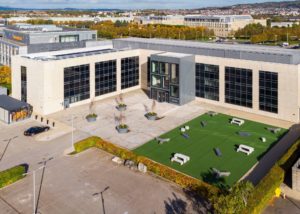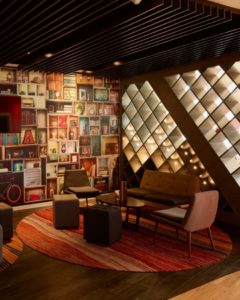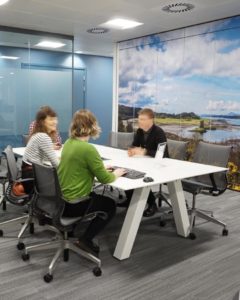While every organisation needs to focus on their own commitment to carbon reduction, embracing the Circular Economy where possible is an important aspect of commercial fit-out projects. Good news stories such as re-using furniture are important for staff and send out the correct message for the organisation. Similarly, the need for organisations to operate in just enough work-space as a means of reducing carbon footprints is important. The concept of the 20-minute neighbourhood can also reduce CO2 emissions by eliminating unnecessary journeys. According to some, there were mixed messages regarding sustainability and the workplace. Cost and the ability to retain staff were more important than sustainability for many businesses currently.
An energy efficient building with the wrong facilities was a non-starter. There are parallels in the housing market, where local amenities are more important and energy efficiency is just one other factor. A sustainable solution needs to address a range of factors and not be focused on too narrow a problem.
Finance
The financial side of responding to the climate challenge is that there is not a bottomless pot of money; local authorities need to balance budgets and landlords need to be careful about passing on necessary improvement costs to tenants. Costs are very relevant and with construction costs continuing to rise it is a fact that going green typically costs more. There is a lot of positive talk, and many people boasting about their green credentials, but when faced with the costs regarding sustainability, words are not always followed through into actions. Are we seeing too many pages of agreements that often actually say very little of any substance?
Communication
Scottish Government carbon reduction targets are set in stone and need to be met. One of the biggest challenges being faced (and it is not restricted to climate change) regards communication. Storytelling is an important part of the journey to net zero. For many large businesses and organisations, there is the resource available to get the message out there, for SME’s it is more of a challenge and this is perhaps an area where the Corporates can mentor SMEs and help share resources. Netzeroedinburgh.org is an online portal specifically designed to bring resources together with City of Edinburgh Council committed to helping create a co-ordinated approach.
Communication and positive messaging is an important part of the journey and organisations shouldn’t be afraid to share their success stories.
There is, in some cases work being carried out that the public are not aware of that are making significant impacts on building performance. It was agreed that messages could play a part in getting people to buy in to sustainability. Framing the story was important; how could tackling energy efficiency in buildings have a positive impact on building users.
Regulation
But what about the pace of change in these discussions? Up until very recently this subject area was on the periphery. Within a few years sustainability will be the absolute priority for everyone. Such is the pace of change when it comes to regulation and guidance that it can be a mine-field for developers knowing where the priorities lie – the last thing they want is to be faced with stranded assets. In light of the evolving nature of this topic, sustainability and our approach to tackling the challenges is a process rather than a single destination. But due to cost implications, tackling every problem is not going to be feasible and resources will require to be targeted.
Summary
With the roundtable being held in a workplace, it was inevitable that hybrid working and occupation would be discussed at some point. We’re two years into this period and the honest answer is that we don’t fully know the direction of travel. There are currently fewer people in offices compared to pre-pandemic level, but it’s too early to know what the future will hold. Currently some businesses are making significant savings in energy due to hybrid working.
It was positive to hear that everyone is asking the same questions, the answers might not be there just yet but guidance will and it is key that people aren’t working in isolation – a joined up approach is needed to solve the problems everyone is facing. The ‘multi-disciplinary’ discussion was felt to be useful in understanding different perspectives.
The importance of communication, getting positive stories out into the public domain and promoting the resources that are available is essential. Organisations are at different points on the journey and it’s important that learning is shared.
The first of the four roundtable events to be held by Space Solutions to commemorate their 25th birthday highlighted the need for positive communications, for clarity on terminology, the importance of sharing information and the understanding that tackling climate change is not going to be easy. Doing nothing is not an option, but targeting of resources will be essential in order to achieve the best possible outcomes.






